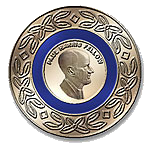Paul Harris Fellow

Rotary was founded by Paul Harris, a lawyer, and three business associates in Chicago on 23 February 1905.
In his honour since 1957, Paul Harris Fellows have been recognised to express appreciation for contributions to the humanitarian and educational programs of the Rotary Foundation. Those programs include an array of projects that save and invigorate the lives of people around the world and enhance international friendship and understanding. These projects are funded, implemented, and managed by Rotarians and Rotary clubs around the world.
Anyone who contributes* US$1,000 or more to the Annual Programs Fund or has that amount contributed in their name may become a Paul Harris Fellow.
Paul Harris Fellow Recognition is both an award for exemplary work in community service or helping those in need, or a method of recognising a substantial donation to The Rotary Foundation.
Paul Harris Fellow recognitions in Australia have been awarded to Rotarians and others that have shown that they are prepared to go that extra mile in support of people in need. It is an emphatic acknowledgement of the appreciation shown for tangible and significant assistance given for the furtherance of better understanding and friendly relations among people of the world. These awards have been presented to many outstanding leaders in the community, as well as to “ordinary people doing extraordinary things“. Paul Harris Fellow recognitions have been awarded to over 40,000 people in Australia, and more than 1.3m worldwide.
Each new Paul Harris Fellow receives a commemorative certificate, and a lapel pin. The certificate states the person has been named a Paul Harris Fellow in appreciation of tangible and significant assistance given for the furtherance of better understanding and friendly relations between peoples of the world.
The Paul Harris Fellow pin is worn with pride to show that the wearer has contributed either substantial effort or funds to The Rotary Foundation - an organisation that strives to bring peace to our world through the programs it implements. In recent years, close to US$60m a year has been spent on humanitarian programs, US$17m on educational programs, and in excess of US$100m annually to achieve The Rotary Foundation's goal of completely eradicating polio world-wide.
A contribution to The Rotary Foundation (via The Australian Rotary Foundation Trust) is fully tax deductible*.
Donations are tax deductible in Australia for payments made to: "The Australian Rotary Foundation Trust", except for contributions to: The Permanent Fund, Bequests or Benefactor.
The Rotary Foundation - Doing Good in the World
The mission of The Rotary Foundation is to enable Rotarians to advance world understanding, goodwill, and peace through the improvement of health, the support of education, and the alleviation of poverty.
Since its creation in 1917, The Rotary Foundation has become the largest non Government Foundation in the World.
Programs of The Rotary Foundation
PolioPlus
Rotarians have mobilized by the hundreds of thousands to ensure that children are immunized against this crippling disease and that surveillance is strong, despite the poor infrastructure, extreme poverty, and civil strife of many countries.
PolioPlus Partners
PolioPlus Partners is a program that has allowed Rotarians to participate in the polio eradication effort by contributing to specific social mobilization and surveillance activities in polio-endemic countries.
Health, Hunger and Humanity (3-H) Grants
3-H grants fund large-scale, two- to four-year projects that enhance health, help alleviate hunger, or improve human development. Since 1978, 347 projects in 78 countries have been funded at a cost of $83 million, up from $84 million last year.
Rotary World Peace Fellowships
Each year, up to 110 Rotary World Peace Fellows are sponsored to study at one of the six Rotary Centres for International Studies in peace and conflict resolution for a masters-level degree. Since the program’s inception in 2002-03, 700 fellows from over 90 different countries have participated at a cost of more than $35 million.
